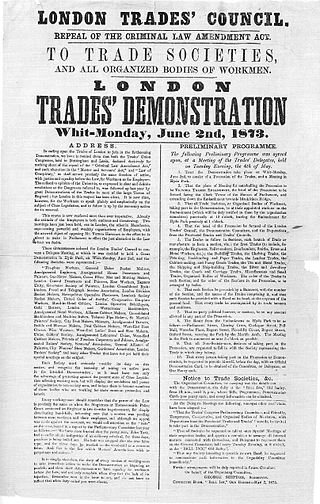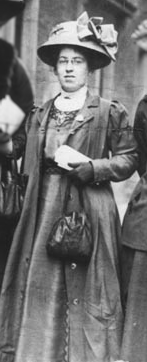Related Research Articles

The Scottish Trades Union Congress (STUC) is the national trade union centre in Scotland. With 40 affiliated unions as of 2020, the STUC represents over 540,000 trade unionists.

William Gallacher was a Scottish trade unionist, activist and communist. He was one of the leading figures of the Shop Stewards' Movement in wartime Glasgow and a founding member of the Communist Party of Great Britain. He served two terms in the House of Commons as one of the last Communist Members of Parliament.
Red Clydeside was the era of political radicalism in Glasgow, Scotland, and areas around the city, on the banks of the River Clyde, such as Clydebank, Greenock, Dumbarton and Paisley, from the 1910s until the early 1930s. Red Clydeside is a significant part of the history of the labour movement in Britain as a whole, and Scotland in particular.

Margaret Grace Bondfield was a British Labour Party politician, trade unionist and women's rights activist. She became the first female cabinet minister, and the first woman to be a privy counsellor in the UK, when she was appointed Minister of Labour in the Labour government of 1929–31. She had earlier become the first woman to chair the General Council of the Trades Union Congress (TUC).
The Australian labour movement began in the early 19th century and since the late 19th century has included industrial and political wings. Trade unions in Australia may be organised on the basis of craft unionism, general unionism, or industrial unionism. Almost all unions in Australia are affiliated with the Australian Council of Trade Unions (ACTU), many of which have undergone a significant process of amalgamations, especially in the late 1980s and early 1990s. The leadership and membership of unions hold and have at other times held a wide range of political views, including socialist, democratic and right-wing views.

The Sheffield Trades and Labour Council, usually known as the Sheffield Trades Council, is a labour organisation uniting trade unionists in Sheffield.

The Liberal Government of New Zealand was the first responsible government in New Zealand politics organised along party lines. The government formed following the founding of the Liberal Party and took office on 24 January 1891, and governed New Zealand for over 21 years until 10 July 1912. To date, it is the longest-serving government in New Zealand's history. The government was also historically notable for enacting significant social and economic changes, such as the Old Age Pensions Act and women's suffrage. One historian described the policies of the government as "a revolution in the relationship between the government and the people".

Mary Reid Anderson was a Scottish suffragist and was a leading trades unionist. She was the general secretary of the Women's Trade Union League and was involved in the formation of the National Federation of Women Workers and National Anti-Sweating League.
The General Secretary of the STUC is the chief permanent officer of the Scottish Trades Union Congress, and a major figure in the trade union movement in the United Kingdom.

John Lemmon was an Australian politician. He served the longest ever term as a member of the Victorian Parliament, being an MLA for over fifty years.

The Trades Union Congress (TUC) is a national trade union centre, a federation of trade unions that collectively represent most unionised workers in England and Wales. There are 48 affiliated unions with a total of about 5.5 million members. Paul Nowak is the TUC's current General Secretary, serving from January 2023.

The London Trades Council was an early labour organisation, uniting London's trade unionists. Its modern successor organisation is the Greater London Association of Trades (Union) Councils

Helen Miller Fraser, later Moyes, was a Scottish suffragist, feminist, educationalist and Liberal Party politician who later emigrated to Australia.
Margaret Hardinge Irwin (1858–1940) was a Scottish suffragist and labour activist who held important posts in the trade union movement.
Mary Laird was a founding member and first President of the Glasgow Women's Housing Association, a President of the Partick Branch of the Women's Labour League, associated with the Red Clydeside movement, and supported the Glasgow Rent Strikes of 1915 alongside Mary Barbour, Agnes Dollan, Mary Jeff and Helen Crawfurd. Laird went on to participate in wider social activism for women and children's rights.

The Printing and Kindred Trades Federation (P&KTF) was a trade union federation in the United Kingdom.

Rachel Devine (1875–1960) was a jute weaver and trade unionist. A founder member of the Dundee and District Union of Jute and Flax Workers who later became its president, she often went to the Scottish Trades Union Congress as her union's delegate.

The Glasgow and West of Scotland Association for Women’s Suffrage was an organisation involved in campaigning for women’s suffrage, based in Glasgow, with members from all over the west of Scotland.
Mary Anderson Snodgrass (1862–1945) was a politician, suffragist and advocate for women's rights.

The Seats for Shop Assistants Act 1899 is a piece of legislation produced by the Parliament of the United Kingdom that attempted to combat the practice of retail employers expecting their female employees to stand for long periods by providing at least one seat for every three female employees. The act also prescribed a fine for not complying of up to three pounds for a first offence, and a fine between one and five pounds for a second offence.
References
- ↑ House of commons. Select committee on home work. House of Commons. 1907. Retrieved 7 October 2020.
- ↑ Irwin, Margaret (1 July 1899). "The Shop Seats Bill Movement". Fortnightly Review. Retrieved 28 August 2020.
- ↑ "The Public General Acts passed in the Sixty-Second and Sixty-Third Years of the Reign of Her Majesty Queen Victoria; being the Fifth Session of the Twenty-Sixth Parliament of the United Kingdom of Great Britain and Ireland". 1899. Retrieved 26 September 2020.
- ↑ Sheila Lewenhak (1977). Women and trade unions : an outline history of women in the British trade union movement. St. Martin's Press. ISBN 978-0312887759.